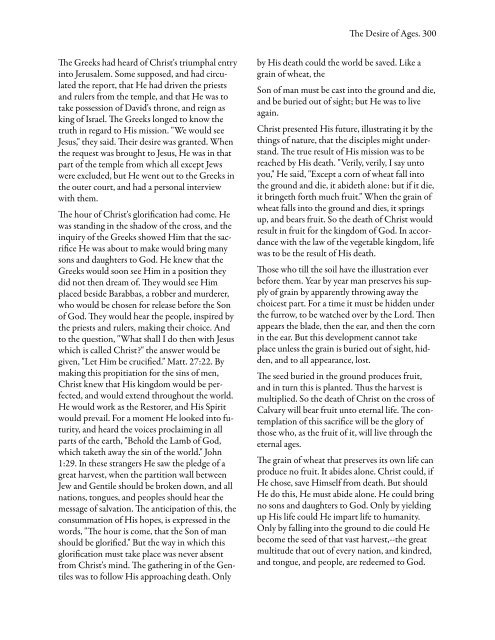The Desire of Ages - Christian Freebies
The Desire of Ages - Christian Freebies
The Desire of Ages - Christian Freebies
Create successful ePaper yourself
Turn your PDF publications into a flip-book with our unique Google optimized e-Paper software.
e Greeks had heard <strong>of</strong> Christ's triumphal entry<br />
into Jerusalem. Some supposed, and had circulated<br />
the report, that He had driven the priests<br />
and rulers from the temple, and that He was to<br />
take possession <strong>of</strong> David's throne, and reign as<br />
king <strong>of</strong> Israel. e Greeks longed to know the<br />
truth in regard to His mission. "We would see<br />
Jesus," they said. eir desire was granted. When<br />
the request was brought to Jesus, He was in that<br />
part <strong>of</strong> the temple from which all except Jews<br />
were excluded, but He went out to the Greeks in<br />
the outer court, and had a personal interview<br />
with them.<br />
e hour <strong>of</strong> Christ's glorication had come. He<br />
was standing in the shadow <strong>of</strong> the cross, and the<br />
inquiry <strong>of</strong> the Greeks showed Him that the sacrice<br />
He was about to make would bring many<br />
sons and daughters to God. He knew that the<br />
Greeks would soon see Him in a position they<br />
did not then dream <strong>of</strong>. ey would see Him<br />
placed beside Barabbas, a robber and murderer,<br />
who would be chosen for release before the Son<br />
<strong>of</strong> God. ey would hear the people, inspired by<br />
the priests and rulers, making their choice. And<br />
to the question, "What shall I do then with Jesus<br />
which is called Christ?" the answer would be<br />
given, "Let Him be crucied." Matt. 27:22. By<br />
making this propitiation for the sins <strong>of</strong> men,<br />
Christ knew that His kingdom would be perfected,<br />
and would extend throughout the world.<br />
He would work as the Restorer, and His Spirit<br />
would prevail. For a moment He looked into futurity,<br />
and heard the voices proclaiming in all<br />
parts <strong>of</strong> the earth, "Behold the Lamb <strong>of</strong> God,<br />
which taketh away the sin <strong>of</strong> the world." John<br />
1:29. In these strangers He saw the pledge <strong>of</strong> a<br />
great harvest, when the partition wall between<br />
Jew and Gentile should be broken down, and all<br />
nations, tongues, and peoples should hear the<br />
message <strong>of</strong> salvation. e anticipation <strong>of</strong> this, the<br />
consummation <strong>of</strong> His hopes, is expressed in the<br />
words, "e hour is come, that the Son <strong>of</strong> man<br />
should be gloried." But the way in which this<br />
glorication must take place was never absent<br />
from Christ's mind. e gathering in <strong>of</strong> the Gentiles<br />
was to follow His approaching death. Only<br />
e <strong>Desire</strong> <strong>of</strong> <strong>Ages</strong>. 300<br />
by His death could the world be saved. Like a<br />
grain <strong>of</strong> wheat, the<br />
Son <strong>of</strong> man must be cast into the ground and die,<br />
and be buried out <strong>of</strong> sight; but He was to live<br />
again.<br />
Christ presented His future, illustrating it by the<br />
things <strong>of</strong> nature, that the disciples might understand.<br />
e true result <strong>of</strong> His mission was to be<br />
reached by His death. "Verily, verily, I say unto<br />
you," He said, "Except a corn <strong>of</strong> wheat fall into<br />
the ground and die, it abideth alone: but if it die,<br />
it bringeth forth much fruit." When the grain <strong>of</strong><br />
wheat falls into the ground and dies, it springs<br />
up, and bears fruit. So the death <strong>of</strong> Christ would<br />
result in fruit for the kingdom <strong>of</strong> God. In accordance<br />
with the law <strong>of</strong> the vegetable kingdom, life<br />
was to be the result <strong>of</strong> His death.<br />
ose who till the soil have the illustration ever<br />
before them. Year by year man preserves his supply<br />
<strong>of</strong> grain by apparently throwing away the<br />
choicest part. For a time it must be hidden under<br />
the furrow, to be watched over by the Lord. en<br />
appears the blade, then the ear, and then the corn<br />
in the ear. But this development cannot take<br />
place unless the grain is buried out <strong>of</strong> sight, hidden,<br />
and to all appearance, lost.<br />
e seed buried in the ground produces fruit,<br />
and in turn this is planted. us the harvest is<br />
multiplied. So the death <strong>of</strong> Christ on the cross <strong>of</strong><br />
Calvary will bear fruit unto eternal life. e contemplation<br />
<strong>of</strong> this sacrice will be the glory <strong>of</strong><br />
those who, as the fruit <strong>of</strong> it, will live through the<br />
eternal ages.<br />
e grain <strong>of</strong> wheat that preserves its own life can<br />
produce no fruit. It abides alone. Christ could, if<br />
He chose, save Himself from death. But should<br />
He do this, He must abide alone. He could bring<br />
no sons and daughters to God. Only by yielding<br />
up His life could He impart life to humanity.<br />
Only by falling into the ground to die could He<br />
become the seed <strong>of</strong> that vast harvest,--the great<br />
multitude that out <strong>of</strong> every nation, and kindred,<br />
and tongue, and people, are redeemed to God.


